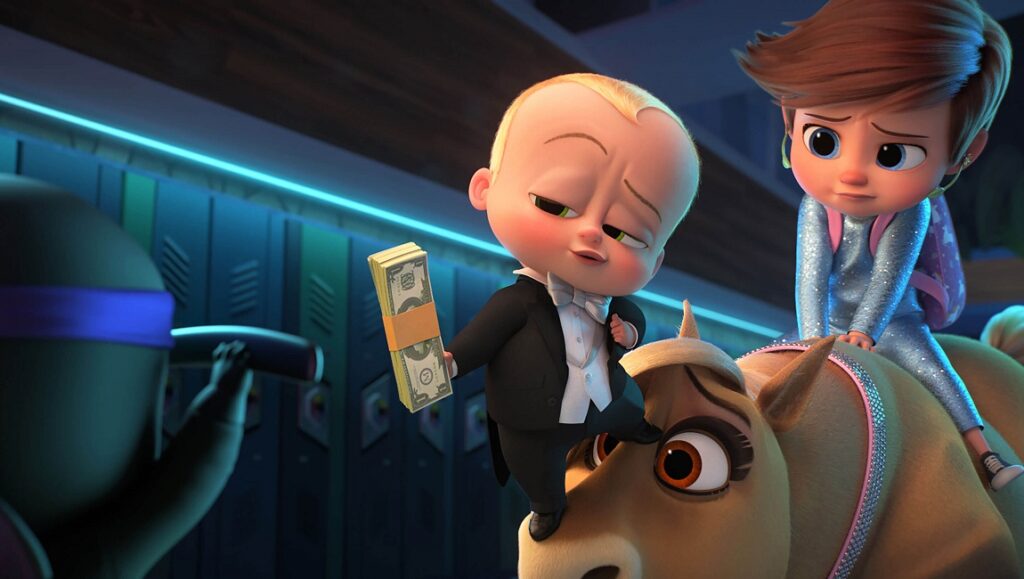Against all odds, Family Business manages to be a wild, engaging sequel to the interminable original Boss Baby.
Dreamworks Animation has always shown a penchant for producing would-be “edgy” family fare, the kinds of films that work overtime in presenting as kid-centric in their storytelling while still equipped with jokes that will fly over the heads of their target audience and straight into the eyes and ears of the parents made to endure the viewing experience. The practice has always seemed a tad desperate, going all the way back to the studio’s debut feature, 1998’s ANTZ, in which Woody Allen voiced an ant going through an existential identity crisis. But of all their efforts, The Boss Baby took the cake when it came to parental pandering, the entire film existing as a riff on the David Mamet-penned Glengarry Glen Ross, going so far as to cast Alec Baldwin in the role of a scheming infant simply so he could utter the line, “Cookies are for closers,” which served as the basis for the film’s entire marketing campaign. Indeed, to state this more clearly, one altered line from a 25-year-old film about real estate salesman, itself adapted from a Pulitzer Prize-winning play, was turned into a financially successful children’s franchise, including a television series and now a sequel, The Boss Baby: Family Business, which doubles-down on the adult shenanigans to shocking success.
Taking a page from such recent animated sequels as The Angry Birds 2, Hotel Transylvania 3, and Madagascar 3, Family Business seems to exist in a world where studio execs trusted the brand’s pull and looked the other way, giving director Tom McGrath and writer Michael McCullers free reign to do whatever they wanted, confident that anything produced could be easily marketed to its target audience. That sense of freedom gives Family Business both a playfulness and beating heart utterly lacking in the original, a considerable achievement considering the first entry centered on a nefarious scheme involving super-intelligent talking babies and the alluring power of puppies. The sequel takes place a good 25 years after the original, as brothers Tim Templeton (James Marsden) and Ted (Baldwin) are now grown and living their own lives. Tim is a sweater-wearing, dorky stay-at-home dad who absolutely adores spending time with his two daughters, 10-year-old Tabitha (Ariana Greenblatt) and baby Tina (Amy Sedaris), while wife Carol (Eva Longoria) goes to work every morning and makes big bucks. Ted, meanwhile, is a highly successful businessman whose busy schedule has caused his once-close relationship with his brother to become estranged. But all that is about to change when it’s discovered that Tina secretly works for Baby Corp., the top secret security company that employs babies from around the world to stop global calamities. Utilizing a special de-aging formula, Tina forces Ted and Tim to take part in her latest mission, as they go undercover in Tabitha’s school to determine the evil plan being concocted by its diabolical founder, Dr. Armstrong (Jeff Goldblum).
Convoluted to the point of absurdity, it’s initially confusing why the filmmakers didn’t simply opt to keep Ted and Tim child-aged instead of jumping through a million mumbo-jumbo hoops that do nothing more than pad out the ridiculous 107-minute running time. But Family Business isn’t about the children, and frankly, doesn’t seem made for them, either. In addition to the Ted and Tim estrangement storyline, there’s also a focus on Tim’s parental woes, and his fear that he is already losing his “little girl” Tabitha, who seems to have outgrown his dopey stories and bedtime songs. Not since Shrek Forever After, a film in which the eponymous ogre goes through a mid-life crisis that has him questioning why he became a parent in the first place, has an animated movie been so fixated on the trials and tribulations of its adult protagonists; it’s to the point that one wonders if any young child could find enjoyment in the proceedings. The moral here — bluntly stated as “Just because you grow up doesn’t mean you have to grow apart” — takes many forms, including both the relationships between Tim and Ted and Tim and his own daughter, as she slowly begins to take charge of her own life. There’s an easy sweetness to narratives of parental love, and how often children take it for granted, but it’s in other scenes here, such as one in which Tim, in child-disguise, listens to the secret fears of his daughter, who is oblivious to what’s going on, that more clearly register, so simultaneously touching and bonkers that it somehow works — though such odd touches are more likely to bore young viewers than anything. Family Business is ultimately a surprisingly patient and vulnerable film, at times even evoking the emotional heights of Pixar’s best (yes, that was just said in regards to a Boss Baby sequel), but it’s worth questioning if there’s enough juvenilia on display to keep kids as interested as the adults in the audience (yes, that was just said in regards to a Boss Baby sequel). There are a few moments of busyness throughout that feel like a bit much, whether it be a five-minute chase scene involving a sled and an exploding Christmas tree, or a horde of baby ninjas, but the action scenes are at least surprisingly nimble and dexterous, employing a welcome few Looney Tunes-like moments that lead to some LOLs. There are also a couple of fantasy sequences that, visually, can be aptly described as “candy-colored German Expressionism,” an unexpected bit of artistic hutzpah for the kiddos. More than anything, The Boss Baby: Family Business is a bona fide anomaly, a mostly fantastic sequel to a film that was borderline unwatchable, and one that adults will likely enjoy even more than their children. It’s tough to imagine anyone was itching for a trilogy in 2017, but if the gonzo energy persists, another chapter in four years would be most welcome.


Comments are closed.